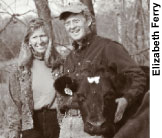Stuart & Margaret Osha
Turkey Hill Farm, Randolph Center, VT
By Cathy Raymond & Travis Williams | May 16, 2010
Visit their Web site Turkey HIll Farm
Excerpts Reprinted with Permission Portrait of a Farm
“The right to farm is very very important. And we are believers that any
person ought to have the right to farm and sell their products...raw milk,
butter, yogurt...up to a certain amount. And then, if you're selling over that
and you're distributing product, you probably need to be watched closer. I
said probably. If we could start with some limits on the small farm that you
could sell the products you produce without having to jump through all the
hoops, it would feed the food system and I think it would feed the economy.
It would certainly feed people.”
 Stuart has seen his share of health troubles, which is one of the reasons he left his successful business and invested his energy into the land and animals. He has three pigs, four cows and a hundred chickens that have beautiful and comfortable living spaces. He espouses raw milk and his strong white teeth and healthy demeanor are an advertisement for what he believes in. Stuart has seen his share of health troubles, which is one of the reasons he left his successful business and invested his energy into the land and animals. He has three pigs, four cows and a hundred chickens that have beautiful and comfortable living spaces. He espouses raw milk and his strong white teeth and healthy demeanor are an advertisement for what he believes in.
He believes in local food and community networks for the economics, the satisfaction, and the practicality of them. He has about 40 regular raw milk customers who all come to the store at Turkey Hill Farm to pick up the product. The store (The "Moo-tique") is a single small room with a fridge (for milk, eggs, and other products), a freezer (for meats, etc.), and two sets of shelves holding maple syrup, Margaret's granola, Stuart's book of poetry and stories, and products from other farms in the neighborhood. They also sell veggies during the summer.
“The demand; people want the quality food and once they know the farmer...it's not just us, there are lots of people like us just in this area...once they know their farmer they get a connection to their food and they want to buy it. They want to eat it. Because they can tell the difference. I mean, you eat one of our meat chickens and you just can tell the difference. You won't want to go back and buy one down at the supermarket. It's not the same.”
He cited many books, individuals, and documentaries that have come out recently regarding the food system and industrialization. Though he owns no television, the Internet has provided access to the popular culture around food lately, which he sees as an improvement in the general support of local systems. He also told us about recent laws and issues around sales of raw milk and small farmers. At any moment he feels that government decisions could put his small operation at risk. The Weston A. Price Foundation has provided a good deal of research around diets and health that Stuart is influenced by.
“Just the fact that there are more farmers, small farmers, producing and the
fact that there are farmers' markets...I think last year was the first year since
the 1950's that the number of farms has grown; but they are small farms,
places like this, that are producing food. And the only reason they're growing
is because people are responding to them. It's just, I think, more of an
awareness...I think it's more of an awareness of what the big boys are producing.”
The Farmer’s Kitchen Classes Schedule
Check out their website for classes in making raw cream butter, gathering and cooking wild edibles and more!
TO REGISTER CALL 802-728-7064 or email [email protected]
|

Stuart and Margaret are 6th generation Vermonters, members of the Farm-to-Consumer Legal Defense Fund, and active volunteer Chapter Leaders of the Weston A. Price Foundation.
While a purposefully modest farm in size and number of livestock, it is truly a model of pasture- and organic-based practices, sustainability and community connectivity.
In Vermont, raw milk can be sold from the farm.
Although the Oshas also have a permit to deliver raw milk, their customers prefer to visit the farm's Moo-tique for the day’s fresh milk while bringing children to visit the two massive Haflingers, the farm's sugaring- season horse power, and see the rotational grazing progress of all the farm’s livestock.
The farm's woodlands yield not only signature Turkey Hill Farm Maple Syrup, it also provides fuel for the maple sugaring arch, radiant floor heating for the farm house and milk house, and the entire farm’s hot water needs.
The house is nearly off the grid, relying only on electricity for lighting and computers.
The Oshas reach out to their community to teach harvesting and food preparation through The Farmer’s Kitchen series of cooking classes taught by Margaret, a traditional farm cook. They also host seasonal festivals for maple sugaring and apple cider making.
A new on-farm-stay apartment that sleeps up to five in the same party will help the Oshas share their sustainability messages with guests from a wider community. Visitors will be experiencing first-hand, real food, life rhythms based on natural cycles, clean air and skies—a quality of living that has been forgotten, or worse, never experienced by many.
When the Oshas dine, every item on their plates is either grown, raised or processed by their own efforts from their own or neighboring small farms.
|